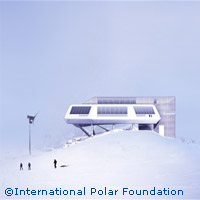Belgian scientists unveil eco-friendly research base to study climate change on Antarctica
The famous Belgian explorer Alain Hubert has unveiled the world's first environmentally friendly polar science station, built to house research on the impact of climate change on the Antarctic. The 'Princess Elisabeth' station aims to be a totally energy self-sufficient research base that will allow scientists to study climate change and generate greater public interest on the issue without leaving a big polluting mark. The €12 million station is a pre-fabricated, aerodynamically-designed wood and stainless steel structure. It will be home to 20 researchers in an interior of 700 square metres. Funded by the Belgian government and private partners, it will be transferred to the South Pole from Belgium in November. 'The base will be the first of its kind to produce zero emissions, making it a unique model of how energy should be used in the Antarctic,' said Alain Hubert, the founder of the Belgium based International Polar Foundation, which investigates the impact of climate change on the polar caps. In total isolation, so as to avoid possible oil spills and other not-so-natural disasters, it will be powered by solar panels on its roof and wind turbines. Water will be recycled and solid waste will be taken away every two years. 'From an ecological point of view it is totally innovative as the base will be practically 'zero-emission',' explained project leader Johan Berte, who believes that it could provide a blueprint for future stations in Antarctica. The scientists at the base will focus their research on climatology, glaciology and microbiology. They will be very involved in the International Polar Year, a global initiative involving more than 50,000 researchers studying how global warming and other phenomena are changing the coldest parts of the Earth, and how this impacts the rest of the world. The initiative is the largest of its type for 50 years, unifying scientists from 63 nations in 228 studies to monitor the health of the polar regions, using icebreakers, satellites, stations and submarines.
Countries
Belgium



